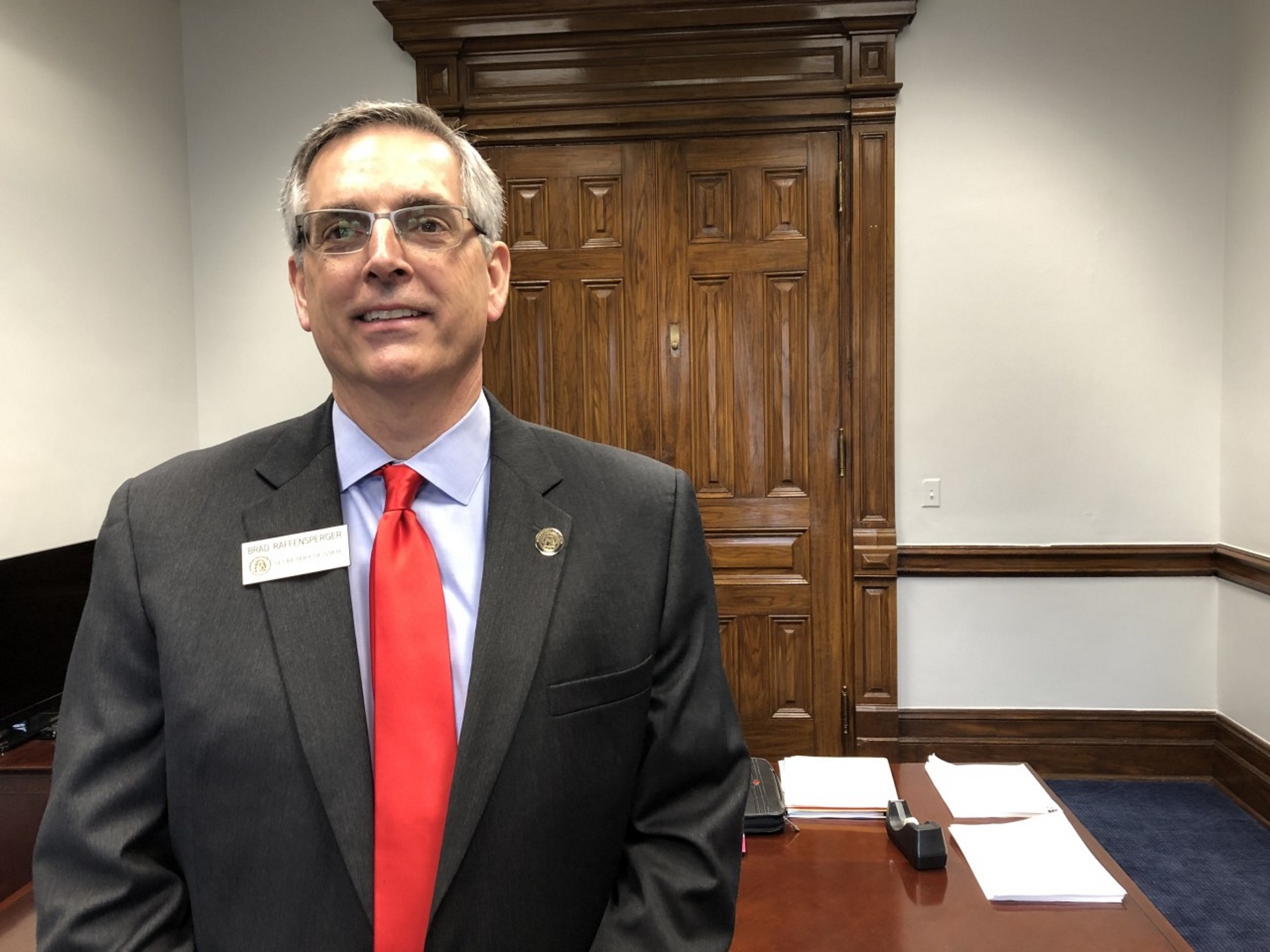As he pushes for lawmakers to pass a measure overhauling how voters cast their ballots, Republican Secretary of State Brad Raffensperger is taking a more public role in the Georgia Legislature than his predecessor, now-Gov. Brian Kemp.
The bill, HB 316, would require electronic machines that print paper ballots be used statewide for in-person voting. That setup would likely include a touchscreen, similar to Georgia’s current voting machines.
“We’re going to get more accurate election results,” Raffensperger said, “I think it’s a more secure way moving forward … I ran on that, and I believe that.”
Raffensperger said he and his staff helped craft the bill, and they’ve been regulars at lengthy committee meetings to speak to lawmakers and answer questions.
Cybersecurity experts say voting using touchscreen computers that print paper ballots exposes elections to potential hacks or malfunctions because the system cannot be truly audited. They prefer hand-marked paper ballots counted by scanners, and then deposited in a ballot box for potential recounts.
Generally, Democrats in the Legislature have opposed moving the state to a touchscreen system with paper ballots and are pushing for paper ballots marked by hand.
“The voting process is obviously the cornerstone of our democracy. We want a process that voters have faith and confidence in,” said Democratic House Minority Leader Bob Trammell. “We’re going to die on that hill, if you will, because it’s important to Georgians.”
Election officials, however, favor the touchscreen ballot markers because they say the intent of the voter is clearer, and Georgians will better adapt to a system more familiar to the touchscreen machines that have been in use for the last 17 years.
In an interview with WABE, Secretary of State Raffensperger argued Georgians want a voting system where ballots are marked by touchscreen computers.
He said those raising security concerns about the ballot-marking devices “are in the minority” and “out of the mainstream.”
Raffensperger cited a poll conducted by Landmark Communications, a political consulting firm based in metro Atlanta, saying Georgians favor ballot-marking devices like those described in the legislation.
But the poll doesn’t point to such a clear answer.
Of 500 Georgians surveyed in the poll, 79 percent of respondents favored “a touch screen electronic voting machine with a verifiable printed ballot” over “a paper-only ballot marked by pencil.”
An Atlanta Journal-Constitution poll found 55 percent of Georgians favor “paper ballots filled in by voters,” while 35 percent favored “paper ballots printed by computer,” and 10 percent didn’t answer.
Members of the public who take the time to attend committee hearings on voting technology show unanimous support for hand-marked paper ballots, but it’s hard to know which voting method Georgians would prefer, or even if they fully understand the difference.
Raffensperger also cited a report from a commission formed by the University of Pittsburgh Institute for Cyber Law, Policy, and Security, that was made up of nonprofit leaders, advocates for paper ballots, computer scientists and government officials.
In its final report published this month, the commission recommended “voter-marked paper ballots (either by hand or by machine) before 2020.”
Although the commission also noted that “ballot-marking devices have their own security concerns.”
HB 316, the billing pending in the Georgia Legislature, includes a number of other provisions not related to voting technology, like restrictions on when polling places can be changed or when an individual can be removed from the voter registration list for not casting a ballot and not responding to mail from the state.
Generally, Democrats favor these kinds of changes to how elections are run, but they still oppose the bill overall because they want Georgia to use hand-marked paper ballots, instead of paper ballots marked by touchscreen computers.
The bill needs to pass the full House and Senate before it goes to Gov. Kemp for his signature.
Here’s a transcript of WABE’s interview with Secretary of State Raffensperger edited for length and clarity.
Why do you support HB 316?
Our voting machines are 17 years old. We need new voting machines. The central part of the bill is updating our voting systems. That’s something that we need to have in place, and we want to have that in place for the 2020 presidential primaries and obviously the 2020 fall election.
HB 316 goes against the recommendations of cybersecurity experts, who say ballot-marking devices are vulnerable to hacks or malfunctions.
If you look at Pennsylvania, they had their commission and they actually say they want it to be voter-marked (hand-marked or machine-marked.) Ours will be voter-marked with touchscreen technology. Those experts in Pennsylvania obviously said both are good. And so this is really what we believe is the best system for Georgia. First of all, we need a unified system. Every voter should be treated the same. I believe if we use touchscreen ballot-marking devices, we’re going to get more accurate results, we won’t have issues with voter intent, and I think it’s a more secure way moving forward. I ran on that. I believe that. I’m supported by the county election supervisors. And 70 percent of Democrats that were polled believe the same as I do, and 80 percent of Republicans believe the same as I do. So these people are in the minority. They’re out of the mainstream.
The cybersecurity experts you’re saying?
And anyone that believes in hand-marked paper ballots. We polled Georgians. You ask Georgians, what does the average person on the street say. Someone that’s not getting paid to show up at some event, some rally, what do they say? Hard-working Georgians, Republican or Democrat, when you have over 70 percent of them saying we want to have a ballot-marking device similar to what we have right now, that’s what they said.
Are you saying that the members of the public who have shown up at committee meetings, and the SAFE commission meetings, are you saying that those folks are paid to show up there?
I’m just saying that a lot of people, you know, seem that they have a special interest. I’m just saying when we poll it, and we polled everyone, those people said that they want to have ballot-marking devices. If people show up and say they want hand-marked paper ballots, I just don’t know if that really represents the views of Georgians. Something doesn’t jive there.
Do you feel that the election in 2018 was well run?
By and large, yes, it was. I think what people need to understand, from both sides of the aisle, is that we want clean, fair and accurate elections. If you lose, you lose, and you win, you win. We want it to be done honestly and fairly, and that’s why I’m excited about the new technology. We’re actually going to have a ballot that’s going to drop into a box so we can do a physical recount in those close elections, and then we can also start doing audits, so that when we do an audit, we’ll be able to say, “Well, the audit actually does show that Mary did get 52 percent of the vote and Bob got 48 percent of the vote. So she really did win.”
If the turnout rate stays about where it was in 2018, are you satisfied with that?
Well it was an incredible turnout, when you look at 66 percent. We used to talk about, “Oh gee, how do we get our voting turnout up to 50 percent?” We had 65 to 66 percent of registered voters show up to vote in that election. That was tremendous turnout. And I think that’s exciting when people are engaged. Both sides were engaged. And that’s what you want to see. So I feel really good about that. We need to be prepared. What happens if it’s 68? What happens if it’s 70 percent? We need to make sure we have enough poll workers in place, enough machines in place, and that’s why we need to get new technology to make sure that all of the machines that are certified are in place.
Did your staff work closely to craft HB 316? Were you involved in that process?
Obviously, we want to have some input in that. We want to make sure the bill conformed to what we believe is best practices. There have been some questions raised in the last couple of years, and so we want to make sure that as we’re looking at the voting machine, we also want to look at other aspects of elections. But as it relates to the voting machine, we feel that our supervisors of elections really can help weigh in on some of the key aspects, really get down into the details so that the wording is correct so that we don’t preclude any systems. Because, at the end of the day, what we want is an RFP process where we get the most number of quotes possible at the best value that we can get for our Georgia taxpayers.
Is there another aspect of the bill we haven’t discussed that you want to talk about?
We reached out to Democrats. I know that Republican leadership met with the Democratic leadership. They had private meetings. I salute both of them on that. Maybe Democrats didn’t get 100 percent of what they wanted, but they got something, and they were heard. I think that’s very important to the process. I think all Georgians want to know was their voices were heard. But we also maybe don’t get 100 percent of what we want because it is a process. We want to make sure that people are heard because voting is your most important right as an American citizen.









